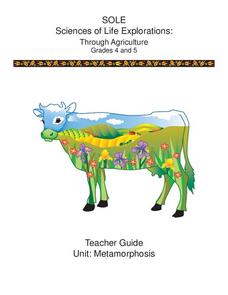Cornell University
Fibers, Dyes, and the Environment
Nanofibers can be made through electrospinning or force spinning in order to reduce the negative impact on the environment. Pupils study the role of fibers and dye on the environment through a series of five hands-on activities. Then,...
University of Northern Iowa
Clothing
As part of an investigation of the folk traditions of their area, class members research the articles of clothing worn at earlier times, the fibers and materials, and the machinery used to produce these items. In addition, class...
Global Oneness Project
Rethinking the Fabrics We Wear
What are fibersheds and what what do they have to do with environmental protections? A photo essay and audio recordings about Mimi Luebbermann, and her sheep, cause consumers to reflect on how their clothing choices can support local...
Cornell University
Metamorphosis
Looking for an insect unit that addresses multiple skill strategies? Young entomologists explore multiple life cycles of insects that go through metamorphosis. The brainteasers and mobile activity spark learner interest before guiding...
Biology Junction
World of Insects: Characteristics, Orders, and Collecting
Every bug is an insect, but not all insects are bugs. A presentation lists the characteristics of insects, describes their body parts, and explains metamorphosis. It also details every order and includes photographs and multiple facts...
Dick Blick Art Materials
Very, Very Simple Decorative Papers
Combine art and science with an activity that has kids gathering items from their environment to include in the decorative paper they create.
American Museum of Natural History
Bio-Benefits
Kick-start a discussion of the importance of biodiversity with a colorful resource that touts the benefits of maintaining healthy ecosystems. The images stress the interdependence of all the elements of an ecosystem.
Dick Blick Art Materials
Matisse Prints du Soleil
The sun provides the link between this art and science activity. Kids use sunlight (or light from an artificial source) to produce heliographic prints on fabric or paper.
Education Outside
Papermaking
Imagine recycling food scraps and using them to make paper. The directions are all here in a seven-page packet that details several paper-making strategies.
Brooklyn Children’s Museum
Rocks and Minerals in Our Lives
Young geologists discover the important role that rocks and minerals play in our everyday lives through this series of hands-on activities. Starting off with a lesson that defines the difference between plants, animals, and...
Mr. E. Science
Sound
Since light travels faster than sound, some people may appear bright until you hear them speak. The presentation covers what sound is, how fast it travels in various mediums, properties of sound, hearing, and the parts of the human...










